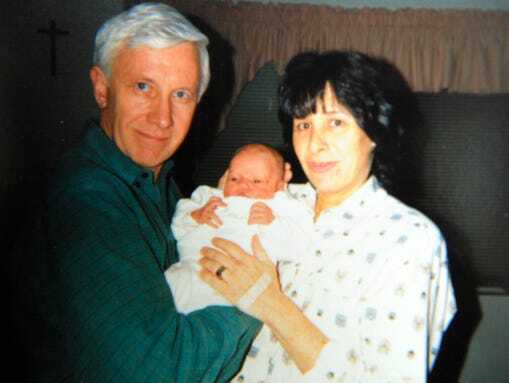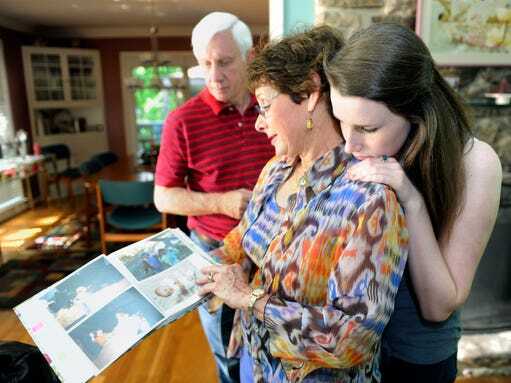On June 11, the Katie Couric Show featured one young donor-conceived woman’s search for her genetic roots. It is a story that has become increasingly familiar in our culture and surely hits close to home and heart for Donor Sibling Registry members. What made this DSR “search and reunion” story big-time TV worthy is that it marked the first time the folks finding each other, and going public, were connected through egg — not sperm — donation.
I watched the show through several lenses — as someone who counsels individuals and couples struggling with infertility, and as one who counsels those who decide to move on to donor conception. I’m also a DSR board member, and not surprisingly, share the DSR’s discomfort with anonymity, as well as commitment to fostering connections. Here’s a brief synopsis of the show — peppered with some of my thoughts and reactions.
Brittan is 16 and has known all her life that she was donor-conceived. Her parents, Janet and Jim, spoke openly and honestly with her from the start about her origins. Although they don’t say so on the show, they may have hoped — as so many ED parents do — that this would be enough. After all, Brittan was wanted, conceived in love, told the truth from the start — all ingredients needed for a happy, secure identity. Or so it seemed until Brittan was about seven years old and began asking herself and her parents challenging questions that included: Who am I? Who am I connected to? And the one that every ED mother fears, “Are you my real mother?”
The TV show presents viewers with a fast-forward. A decade has elapsed since Brittan began asking questions and her parents began confronting their own feelings and her need to know. Katie Couric offers up “multi hanky” segments in which Brittan meets her donor and her donor’s two daughters (aka her half-siblings). When asked how they feel about Brittan meeting her donor JoLana, and JoLana’s daughters, Janet and Jim say that they are excited for their daughter. They add that they anticipate that JoLana will be a positive role model, and that meeting her will fill in some missing pieces for Brittan. To this, Couric says something to the effect of, “I admire you. I think if it were me, I’d feel threatened. You may be a bigger person than I am.”
These comments jumped out for me. Knowing how vulnerable infertile couples and individuals are, I imagined viewers reacting to Couric’s comments with relief. Some must have been watching with a pit in their stomach, feeling, “I’ll love and care for this child for 18 years and then she’ll leave me to find her ‘real’ family.” Others might not feel quite so threatened by the idea that Brittan would want to know where she came from and fill in some missing pieces but still feel validated by Couric’s acknowledging that all donor parents don’t automatically support their child’s search for genetic kin. So I understood what she was saying and why, but as a mom who has accompanied so many others into motherhood, I had a different perspective. Parenthood is about sharing, about stepping out of one’s comfort zone, about accepting things you never thought you could accept, and about bending and adjusting and recalibrating one’s expectations.
“You can approach it from a position of fear or you can approach it from a position of love,” Wendy Kramer says when we talk after the show. She adds, “Janet acted from a position of love, and that strengthened her relationship with Brittan.” As usual, Wendy had a way of gathering together my scattered thoughts and stringing them together in one clear sentence that says it all: You can choose fear or you can choose love, and when you choose love, the path becomes easy.
I meet so many people who have been beaten to a pulp by infertility. For years they’ve been told “You’ve had a failed cycle” or “You are a poor responder” or simply, bluntly, “You have bad eggs.” When they finally arrive at parenthood through egg donation they are understandably worried that they won’t feel like “real” mothers, and they may feel somehow threatened by the donor. What I think Katie Couric was missing and Wendy Kramer was affirming is that years of parenthood authenticate you, give you confidence, and broaden your perspective. Janet and Jim welcome JoLana into their daughter’s life after years — most likely — of accepting teachers and friends and media influences that they would not have chosen for their daughter. With JoLana they have — Kramer points out — more control. As she said wisely on TV and reiterated when we spoke, “They need to take it slowly.”
And so this is my message to my infertile clients who might have been a bit unnerved by The Katie Couric Show.... When you have a child, you will know that you are a real mom. You will gain confidence through the day-to-day, week-to-week care of your child. Your “realness” will be affirmed and reaffirmed when you are the tooth fairy or baking a Spider-Man birthday cake or standing on the sidelines of a soccer game in the rain or volunteering as the kindergarten room mother. As the years go by, you will make countless decisions because you believe they are right for your child. You will agree to do things simply because your child asks you to and in bringing him or her happiness, you will share in the joy. I believe that this is how it will be with your donor and with other genetic kin. If your daughter wants to meet her donor or your son seeks donor siblings, you will find yourself accompanying her or him on the journey. Early on, you will find what you probably already know — that your support and preparedness to go along brings you closer and further fortifies your relationship.


 Browse by Clinic
Browse by Clinic
 Become a Member
Become a Member

